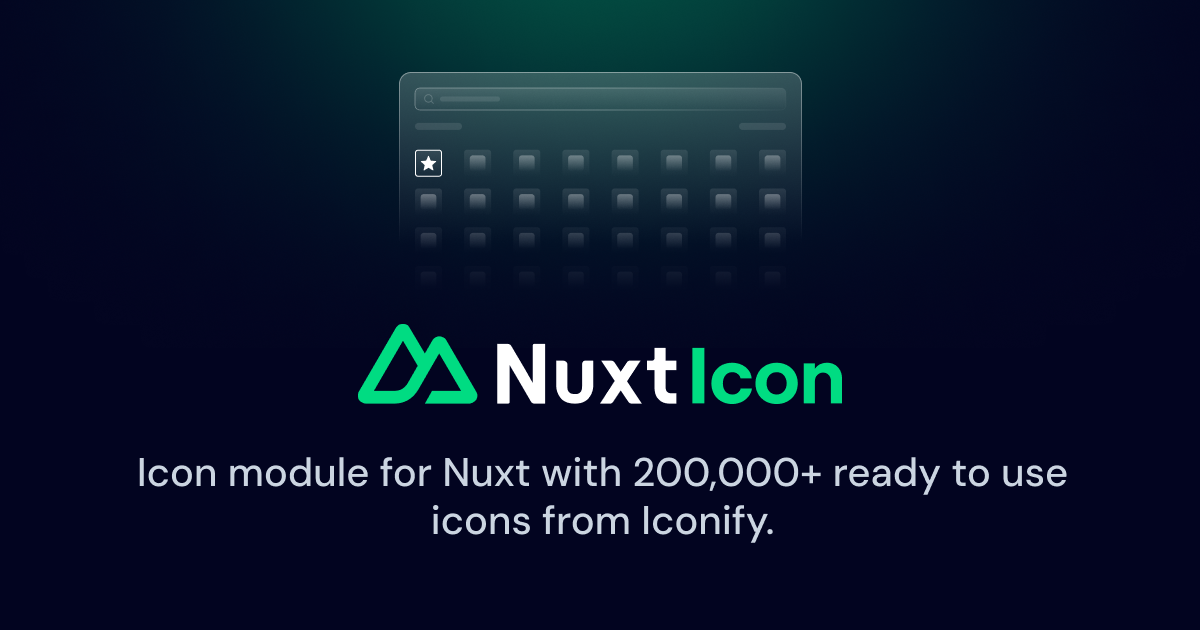
# Nuxt Icon
[![npm version][npm-version-src]][npm-version-href]
[![npm downloads][npm-downloads-src]][npm-downloads-href]
[![License][license-src]][license-href]
[![Nuxt][nuxt-src]][nuxt-href]
Manual Setup
You can install the module manually with:
```bash
npm i -D @nuxt/icon
```
Update your `nuxt.config.ts`
```ts
export default defineNuxtConfig({
modules: [
'@nuxt/icon'
]
})
```
If you have the legacy module `nuxt-icon` installed, you might want to remove it from the `modules` list.
## Usage 👌
**Props:**
- `name` (required): icon name or global component name
- `size`: icon size (default: `1em`)
- `mode`: icon rendering mode (`svg` or `css`, default: `css`)
**Attributes**:
When using an icon from Iconify, a `` or `` will be created based on the rendering mode, you can give [all the attributes](https://developer.mozilla.org/en-US/docs/Web/SVG/Attribute) of the native element.
```html
>
>
> ```
### Render Function
You can use the `Icon` component in a render function (useful if you create a functional component), for this you can import it from `#components`:
```ts
import { Icon } from '#components'
```
See an example of a `` component:
```vue
```
## Contributing 🙏
1. Clone this repository
2. Install dependencies using `pnpm install` (install `pnpm` with `corepack enable`, [learn more](https://pnpm.io/installation#using-corepack))
3. Run `npm run dev:prepare` to generate type stubs.
4. Use `npm run dev` to start [playground](https://github.com/nuxt-modules/icon/tree/main/playground) in development mode.
## Credits 💌
- [@benjamincanac](https://github.com/benjamincanac) for the initial version
- [@cyberalien](https://github.com/cyberalien) for making [Iconify](https://github.com/iconify/iconify)
## License 📎
[MIT License](https://github.com/nuxt-modules/icon/blob/main/LICENSE)
[npm-version-src]: https://img.shields.io/npm/v/@nuxt/icon/latest.svg?style=flat&colorA=18181B&colorB=28CF8D
[npm-version-href]: https://npmjs.com/package/@nuxt/icon
[npm-downloads-src]: https://img.shields.io/npm/dm/@nuxt/icon.svg?style=flat&colorA=18181B&colorB=28CF8D
[npm-downloads-href]: https://npmjs.com/package/@nuxt/icon
[license-src]: https://img.shields.io/github/license/nuxt-modules/icon.svg?style=flat&colorA=18181B&colorB=28CF8D
[license-href]: https://github.com/nuxt-modules/icon/blob/main/LICENSE
[nuxt-src]: https://img.shields.io/badge/Nuxt-18181B?logo=nuxt.js
[nuxt-href]: https://nuxt.com